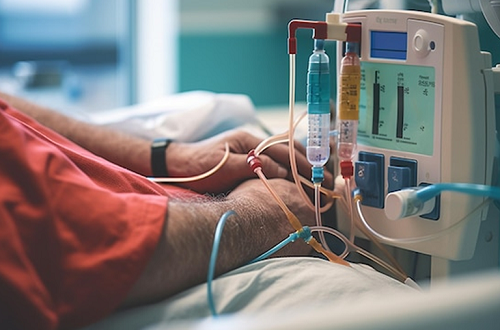Hemodialysis

Hemodialysis (HD) is a common kidney replacement therapy used to treat individuals with kidney failure (end-stage renal disease). It involves the removal of waste, toxins, and excess fluid from the bloodstream when the kidneys are no longer able to perform these functions effectively.
Hemodialysis is a life-saving treatment for patients with kidney failure, offering effective management of waste removal and fluid balance. Despite its effectiveness, it comes with challenges such as the need for regular, time-consuming treatments, and potential complications. Ongoing support and advancements in dialysis techniques continue to improve outcomes and quality of life for patients.
How Hemodialysis Works
Access:
- A vascular access is created to facilitate blood flow for dialysis. This can be a fistula, graft, or central venous catheter.
- Fistula: Surgically created connection between an artery and vein in the arm.
- Graft: A synthetic connection between an artery and vein.
- Central Venous Catheter: Temporary access using a catheter inserted into a large vein, commonly used for short-term dialysis.
Dialysis Machine and Filter:
- The patient’s blood is drawn from the access point and filtered through a machine containing a special filter called a dialyzer (artificial kidney).
- Waste products, excess fluids, and toxins are removed, while essential nutrients are retained.
Blood Return:
- Cleaned blood is then returned to the body through the vascular access.
Procedure Overview
- Hemodialysis sessions typically last 3-5 hours.
- Treatment is usually performed three times per week.
- Blood is cycled through the dialysis machine, and after treatment, patients may feel fatigued or refreshed depending on their condition and fluid balance.
Advantages of Hemodialysis
- Effective Waste and Fluid Removal:
- Efficient in removing toxins, excess fluid, and waste products from the blood.
- Widely Available:
- Offered at dialysis centers and hospitals, ensuring accessibility for most patients.
- Short-Term Access:
- Catheters provide a temporary solution for immediate dialysis needs if a permanent access is not yet established.
If you’d Similarly help finding the best kidney specialist in Aardhya Balaji Kidney Care,Book your Appointment Now!
When is Hemodialysis Needed?
- End-Stage Renal Disease (ESRD):
- When kidney function declines to a point where the kidneys can no longer support basic bodily functions.
- Acute Kidney Injury (AKI):
- In severe cases of temporary kidney failure, hemodialysis may be required until kidney function is restored.
Preparation and Lifestyle Changes
- Dietary Changes:
- Limit protein, potassium, sodium, and fluid intake to avoid complications like hyperkalemia and fluid overload.
- Lifestyle Modifications:
- Regular exercise and a healthy diet can improve outcomes.
- Mental and Emotional Support:
- Patients may experience anxiety, depression, or stress related to their condition and treatment schedule.
